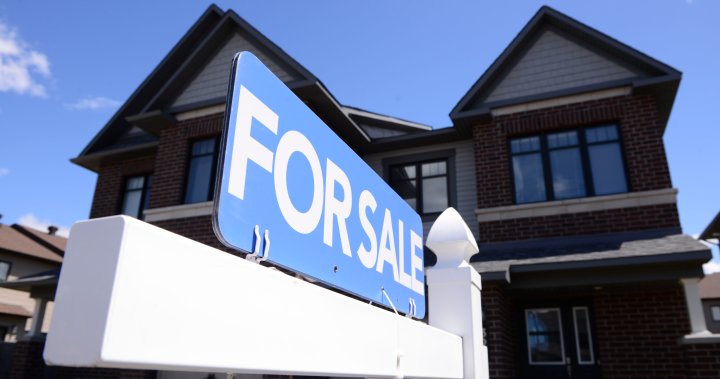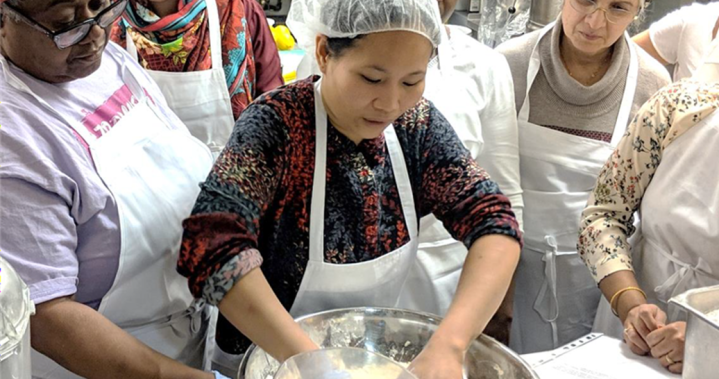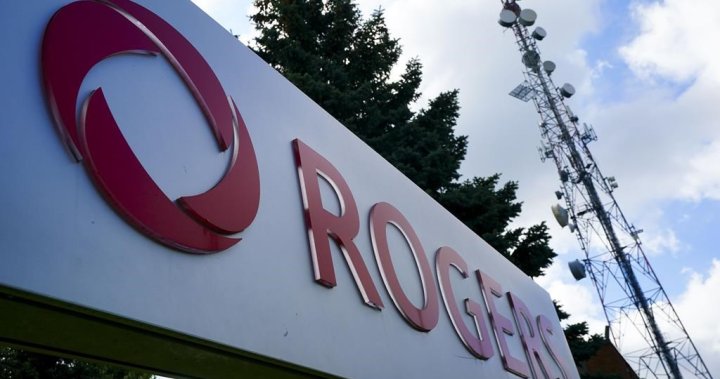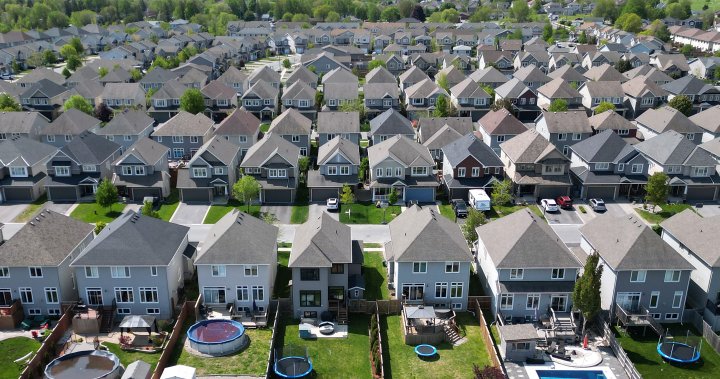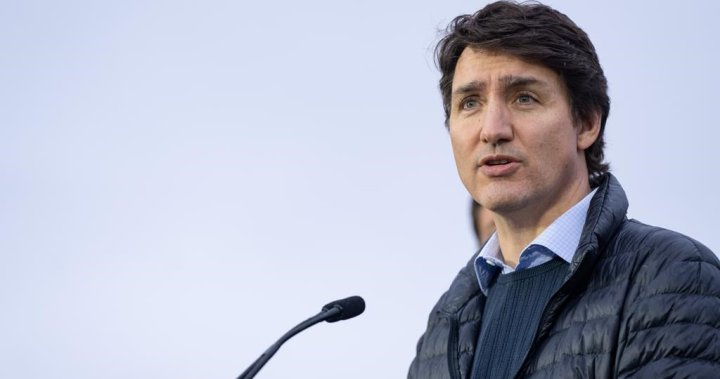The cost-of-living crisis facing Canadians is only getting more bleak, according to new polling that shows everything from buying a first home to affording groceries has gotten harder in the past year.
On Friday, Ipsos polling conducted exclusively for Global News showed that four in five Canadians (80 per cent) now feel that owning a home is only for the rich. That’s 11 points higher than a similar poll from just over a year ago in March 2023.
The belief that home ownership is the domain of the rich is most widely held among 90 per cent of gen Z respondents (those born between 1997 and 2005) and 82 per cent of millennials (born 1981-1996).
However, 77 per cent of gen X respondents (born 1965-1980) and 78 per cent in the baby boomer group (born 1910-1964) also hold that belief.
The survey, conducted after the 2024 federal budget’s release last week, shows that 72 per cent of non-owners in Canada have now “given up” on ever owning a home, a figure that’s nine percentage points higher than last year’s polling.
While most respondents believe it’s possible to be financially secure without owning a home (71 per cent), that figure is nine percentage points lower than last year. Some 36 per cent said they would be looking to find somewhere to rent this year, compared with 14 per cent who said they’d be trying to buy a home.
Darrell Bricker, CEO of Ipsos Global Public Affairs, says this latest polling reveals how “incredibly stressed” the idea of home ownership is making Canadians.
“You can see why the anxiety is so high, because an increasing number of people believe they need to own a home, but fewer and fewer people believe that they can,” he tells Global News.
Only 23 per cent of those surveyed feel the federal government is doing enough to address housing affordability, four percentage points fewer than last year.
More than half of Canadians believe that the country will fail to build enough housing to keep up with demand, despite pledges in Budget 2024 to rapidly scale up the pace of homebuilding in the country over the next eight years.
Financial news and insights
delivered to your email every Saturday.
Nearly six in 10 (58 per cent) believe that average home prices will rise in 2024, up 23 percentage points from last year when a price correction tied to rising interest rates gripped housing markets across Canada.
Though the overall rate of inflation has cooled from highs of 8.1 per cent in the summer of 2022 – the latest readings from Statistics Canada report 2.9 per cent inflation in March – the Bank of Canada’s policy rate remains elevated, forcing Canadians to cope with higher borrowing and shelter costs.
Some 23 per cent of those surveyed believe that the Bank of Canada will lower its benchmark interest rate this year.
The latest inflation report also showed that annual price hikes at the grocery store have cooled to 1.9 per cent as of March, well below the double-digit readings seen at the peak of inflation.
But the cumulative pinch at the grocery store is forcing many Canadians to change their shopping habits and make other financial sacrifices to make ends meet, the Ipsos poll shows.
Some 83 per cent of respondents said their weekly grocery bill has gone up over the past six months, by an average of $78.90.
The polling noted that lower-income households are typically seeing bigger cost hikes on their trips to the grocery store. A third of those earning less than $40,000 say they’re spending $51-$100 more per week, compared with around one in five households that earn between $60,000 and $100,000.
Coping with the higher cost of living ranges from relying on sales to cutting back in other areas of the household budget.
Some 61 per cent said they’re looking at flyers for sales (up 13 per cent from last year), 34 per cent said they’ve switched to a cheaper grocery store (up seven per cent from 2023), and roughly a third of respondents said they’re buying less meat and fresh fruit and vegetables. Eleven per cent of respondents said they’re accessing food banks.
Executives at Metro Inc. said during the grocer’s earnings call on Tuesday that despite the easing in food inflation, the wider economic picture is still putting pressure on consumers, pushing them to trade down at the grocery store.
Bricker says Canadian politicians ought to stop focusing on inflation when they talk to Canadians about the cost of living, because the headline price figures don’t necessarily translate to the actual pressures facing households.
“Whether inflation is up or down is not as relevant as what you experience in your day-to-day lives. And nothing could be more fundamental than shopping for your groceries,” he says.
Meanwhile, 61 per cent are also dining out less (up 13 per cent from 2023) and 53 per cent are putting off purchases like new clothes (also up 13 per cent from last year). One in 10 of those surveyed said they’ve delayed or not renewed a medical prescription due to cost-of-living concerns.
With a bigger chunk of the monthly budget going to cost-of-living expenses, some Canadians have less to put away in savings – some 21 per cent said they’re putting retirement saving on pause as life becomes more expensive, six percentage points higher than in March 2023.
Some 29 per cent said they’ve dipped into their personal savings to make ends meet, while 15 per cent are using the money they’ve put aside for retirement.
The burden for addressing affordability and housing issues doesn’t just rest on the mantle of the federal government, Bricker notes, but the Ipsos polling released earlier this week done exclusively for Global News shows that Budget 2024 failed to move the needle for Prime Minister Justin Trudeau’s Liberal Party, which now trails the Conservative Party by 19 points in the polls.
Bricker says he believes the primary reaction to the intensifying cost-of-living crisis is going to be a “political” one, as the message from policymakers so far about how they’re tackling economic challenges does not seem to be ringing true with Canadians.
“They’re looking for somebody to take action. They’re looking for somebody to blame,” he says.
“I think our incumbent politicians are going to have a lot of work to do in order to convince Canadians that they should be re-elected.”
These are some of the findings of an Ipsos poll conducted between April 17 and 18, 2024, on behalf of Global News. For this survey, a sample of 1,001 Canadians aged 18-plus was interviewed. Quotas and weighting were employed to ensure that the sample’s composition reflects that of the Canadian population according to census parameters. The precision of Ipsos online polls is measured using a credibility interval. In this case, the poll is accurate to within ± 3.8 percentage points, 19 times out of 20, had all Canadians aged 18-plus been polled. The credibility interval will be wider among subsets of the population. All sample surveys and polls may be subject to other sources of error, including, but not limited to, coverage error and measurement error.
